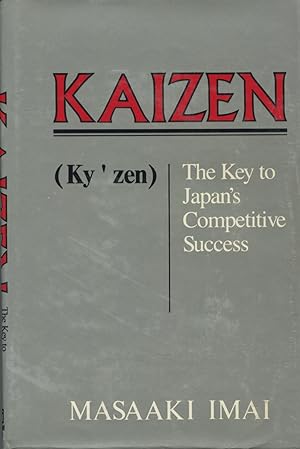Synopsis:
KAIZEN means gradual, unending improvement, doing "little things" better; setting--and achieving--ever-higher standards.It is KAIZEN, says Masaaki Imai, that is the simple truth behind Japan's economic "miracle" and the real reason the Japanese have become the masters of "flexible manufacturing" technology--the ability to adapt manufacturing processes to changing customer and market requirements, and do it fast.For the U.S., KAIZEN's clear message is "do it better, make it better, improve it even if it ain't broke, because if we don't, we can't compete with those who do."Now, for the first time, Western managers have a comprehensive handbook of 16 KAIZEN management practices they can put to work. Using more than 100 examples of KAIZEN in action, 15 corporate case studies, and 50 charts and graphs, Mr. Imai examines step by step all the roles KAIZEN plays in...* Profit planning.* Customer satisfaction.* Total quality control programs.* Suggestion systems.* Small-group activities.* Just-in-time production.* Systems improvement.* Cross-functional management.* Policy implementation or "deployment."* Quality deployment.* Total productive maintenance.* Supplier relations.* Top management commitment.* Corporate culture.* Problem solving in such areas as labor-management relations.In The Key to Japan's Competitive Success, Mr. Imai shows......how introducing KAIZEN practices into the workplace, may easily increase productivity by 30%, 50%, even 100% or more without major capital investment......how KAIZEN can lower the break-even point......how KAIZEN enables a company to seize competitive opportunities quickly--in either a slow-growth or fast-growth economy......and why KAIZEN can work in any culture (not just Japan).
Reviews:
Books about Japanese management have become kind of a cottage industry, from Theory Z ( LJ 5/1/81) to The Art of Japanese Management ( LJ 8/1/81) and The Mind of the Strategist ( LJ 6/1/82) to Kaisha: the Japanese corporation ( LJ 12/85). This volume covers some of the same groundthe current superiority of Japanese management stylebut approaches things from a different perspective. Essentially, Imai contends that the Japanese edge can be found in a philosophical orientation captured in the concept of Kaizen. Kaizen management is anchored in the notion of perpetual improvementeven if all is going well. In contrast to U.S.-style management, it takes a longer-run view and is process-oriented rather than geared to immediate results. Importantly, the Kaizen philsophy is also quantifiable , rooted in the mathematics of quality control theory. Recommended. Gene Laczniak, Coll. of Business Administration, Marquette Univ., Milwaukee
Copyright 1986 Reed Business Information, Inc.
"About this title" may belong to another edition of this title.
![]()
